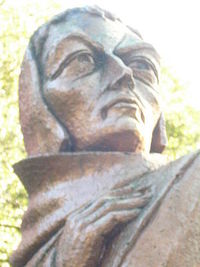Duns Scotus
Philosopher
John Duns, O.F.M., commonly called Scotus or Duns Scotus (/dʌnz ˈskoʊtəsˌ ˈskɒtəs/; c. 1266 – 8 November 1308), is generally considered to be one of the three most important philosopher-theologians of the High Middle Ages. Scotus has had considerable influence on both Catholic and secular thought. The doctrines for which he is best known are the "univocity of being," that existence is the most abstract concept we have, applicable to everything that exists; the formal distinction, a way of distinguishing between different aspects of the same thing; and the idea of haecceity, the property supposed to be in each individual thing that makes it an individual. Scotus also developed a complex argument for the existence of God, and argued for the Immaculate Conception of Mary.Duns Scotus was given the medieval accolade Doctor Subtilis (Subtle Doctor) for his penetrating and subtle manner of thought. He was beatified by John Paul II'>Pope John Paul II in 1993.
Personal facts
| Alias (AKA) | Duns Scotus; Scotus; Duns Scotus John |
|---|
| Birth date | January 01, 1266 |
|---|
| Birth place | Duns , Kingdom of Scotland , Berwickshire |
|---|
| Date of death | November 08, 1308 |
|---|
| Place of death | Cologne , Holy Roman Empire , Electorate of Cologne |
|---|
| Era | |
|---|
| Main interest | |
|---|
